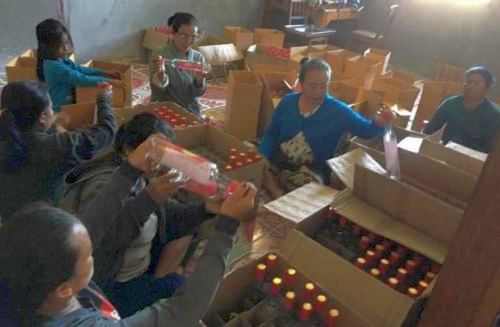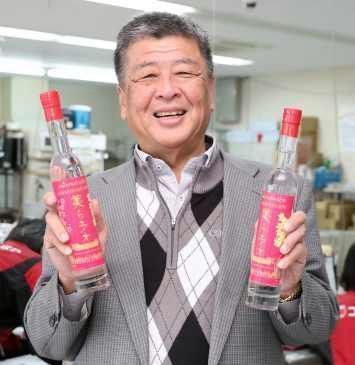The Original Awamori opportunity with Lao-Lao made by Lao women

Lao women boxing up bottles of Chura Lao. December 24, Laos (Photograph provided by Co-Op Okinawa.)
December 26, 2019 Ryukyu Shimpo
By Yuki Nakamura
In the new year, Co-Op Okinawa (Urasoe City, Okinawa) will begin importing the Lao traditional alcohol Lao-Lao into Okinawa to support industrialization in Laos. Currently, Lao-Lao is produced and sold in Laos and a portion of profits is contributed to solving regional problems such as poverty. Co-Op Okinawa plans to sell the alcohol in Okinawa, primarily in Co-Op Okinawa stores. The sales target for the first year is 7000 bottles with a planned price of approximately 1000 yen for a 500 ml bottle. The hope is to expand the operation beyond Co-Op stores.
Lao-Lao is a distilled rice alcohol and is said to be the predecessor of Awamori. In Laos, the liquor is made at home and privately sold by volume. However, in recent years, bottled alcohol has come into small towns from cities and sales of homemade Lao-Lao have declined.

Osamu Ishihara of Co-Op Okinawa who helped commercialize Chura Lao. Nishihara, Urasoe City.
In 2017, Co-Op Okinawa established the Lao-Lao Alcohol Co-op, gathering 39 women distillers in the southern Lao town of Xay in order to commercialize Lao-Lao. In 2018, they set up a factory and a system for mass production. The organization is run exclusively by locals and as a result, operations and accounting are led mainly by four women who can read and write.
The women designed the package and bottled the alcohol for commercialization under the name Chura Lao. To guarantee the flavor, the Kumesen Sake Brewery in Naha is in charge of quality control. Chura Lao is sold in Laos for approximately 550 yen per bottle. The majority of the annual 8000 bottles sold are through restaurants and hotels. The plan is for 30% of sales to go toward paying Co-Op members, 20% to be retained within the organization, and 2% to be laid aside to tackle challenges such as poverty.
In Xay, where self-sufficiency is the norm, a household’s monthly income is between 3000-4000 yen. At the Chura Lao factory, workers can earn approximately 1000 yen per month only working once each week, so the factory contributes to raising wages.
According to Osamu Ishihara of Co-Op Okinawa, “In the past, they have just made the alcohol and sold it. By putting the alcohol in bottles and commercializing, value is created. This will help to lay the foundations of industry and solve poverty.”
(English translation by T&CT and Ellen Huntley)
Previous Article:Ryukyu performance arts win national arts awards
Next Article:Editorial:With Henoko construction costs expected to reach 930 billion yen, land reclamation must be stopped at once
[Similar Articles]
- Yamakawa Shuzo Co. LTD. sells awamori aged 40 years. Only 100 bottles will be sold
- Iejima-rum surges in popularity to enjoy large sales
- PET bottles save drowning man in river
- Orion to cease production of 9% alcohol by volume “Watta Strong” chuhai due to health concerns
- Orion Breweries Ltd. achieves twice its sales goal in Hong Kong within six months
 Webcam(Kokusai Street)
Webcam(Kokusai Street)


